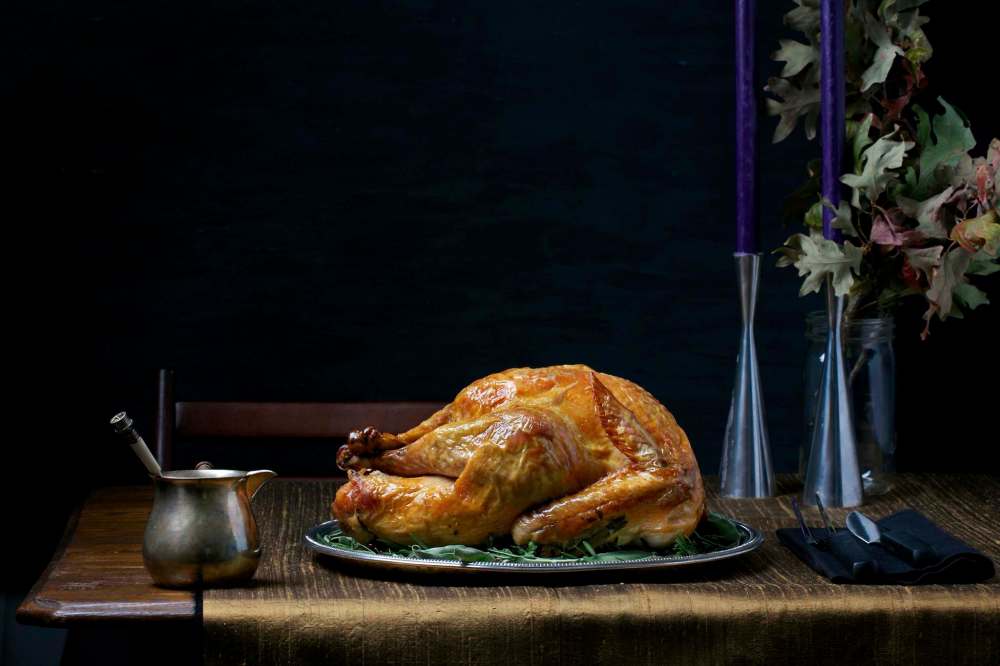Avoid food-borne illness when cooking holiday turkey
Follow these simple rules when prepping your dinner
Advertisement
Read this article for free:
or
Already have an account? Log in here »
To continue reading, please subscribe:
Monthly Digital Subscription
$1 per week for 24 weeks*
- Enjoy unlimited reading on winnipegfreepress.com
- Read the E-Edition, our digital replica newspaper
- Access News Break, our award-winning app
- Play interactive puzzles
*Billed as $4.00 plus GST every four weeks. After 24 weeks, price increases to the regular rate of $19.95 plus GST every four weeks. Offer available to new and qualified returning subscribers only. Cancel any time.
Monthly Digital Subscription
$4.99/week*
- Enjoy unlimited reading on winnipegfreepress.com
- Read the E-Edition, our digital replica newspaper
- Access News Break, our award-winning app
- Play interactive puzzles
*Billed as $19.95 plus GST every four weeks. Cancel any time.
To continue reading, please subscribe:
Add Free Press access to your Brandon Sun subscription for only an additional
$1 for the first 4 weeks*
*Your next subscription payment will increase by $1.00 and you will be charged $16.99 plus GST for four weeks. After four weeks, your payment will increase to $23.99 plus GST every four weeks.
Read unlimited articles for free today:
or
Already have an account? Log in here »
Hey there, time traveller!
This article was published 22/12/2017 (2951 days ago), so information in it may no longer be current.
’Tis the season for holiday family dinners and tables filled with stuffing, mashed potatoes, roasted vegetables, cranberry sauce, gravy and, of course, turkey.
Be sure your friends and family enjoy amazing food and leave with great memories this holiday season.
The last thing you want everyone to remember is a holiday season filled with stomach aches and numerous trips to the bathroom.

Whether you’re making a turkey dinner for the first time or you’ve done it before, follow these tips to prevent food-borne illness from invading your holiday dinner table.
Thawing
Never allow your turkey to thaw on the counter at room temperature.
This may allow bacteria to grow, which can lead to food-borne illness if the turkey is not cooked properly.
The safest way to defrost a frozen turkey is to let it thaw in the refrigerator. Defrosting your turkey may take a couple of days, so make sure to plan ahead.
For every 2.5 kilograms (five pounds), allow 24 hours to defrost in the refrigerator.
Place the turkey in a container or on a platter so raw juices do not contaminate other foods. Make sure that it is placed on the bottom shelf of the refrigerator.
If you didn’t allow enough time to thaw your turkey in the refrigerator, it can be defrosted in cold water.
You can run the bird under cold water in the sink or place it in a container with cold water until the bird thaws. Change the water in the container every 30 minutes until the job is done. Once the turkey is no longer frozen, cook it immediately.
Stuffing your bird
Whether you choose to stuff your turkey with a bread, meat or rice stuffing, it will take time to prepare ingredients.
Ensure that your stuffing is cooked in a separate dish, not inside the bird. Stuff the turkey loosely before roasting, and remove all of the stuffing immediately after cooking.
Stuffing should be heated to a minimum internal temperature of 165 F (74 C). Be aware that stuffing the bird will increase cooking time.
Cooking
Turkey should never be consumed raw. The turkey is ready when the thickest part of the bird has reached 180 F (82 C).
Colour is not a reliable indicator that the meat is safe to eat, always ensure that it is thoroughly cooked by using a meat thermometer.
For accuracy, be sure that the thermometer isn’t touching any bones. Wash the thermometer if it comes in contact with raw meat.
Cross-contamination
To avoid cross-contamination, wash your hands well and clean and sanitize any surfaces, utensils and dishes that come in contact with the raw turkey and its juices.
Leftovers
Be sure to refrigerate or freeze any leftovers within two hours of cooking to minimize the growth of bacteria.
Use refrigerated leftovers within two to four days and ensure that food is reheated to 165 F (74 C).
Leftovers shouldn’t be reheated more than once.
Common bacteria associated with turkey include campylobacter jejuni, salmonella, clostridium perfringens.
These bacteria can cause food-borne illness if your turkey isn’t cooked or stored properly.
Symptoms will often occur within hours or days after consuming contaminated foods.
To avoid abdominal pain, diarrhea, fever, nausea and vomiting this holiday season, follow the above steps when preparing your holiday turkey.
You and your guests will be glad you did.
For more information on poultry food safety, please visit canada.ca/en/health-canada/services/meat-poultry-fish-seafood-safety/poultry-safety.html.
For food and nutrition related questions, please call Dial-a-Dietitian at 204-788-8248.
Victoria Wojakowski is a University of Manitoba nutrition practicum student with the Winnipeg Regional Health Authority.
History
Updated on Friday, December 22, 2017 6:22 AM CST: Photo added

